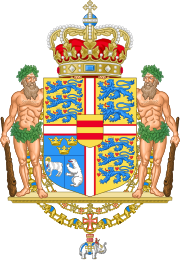 Global Information
Global InformationForeign relations of Denmark information
Politics of Denmark |
|---|
 |
|


The foreign policy of Denmark is based on its identity as a sovereign state in Europe, the Arctic and the North Atlantic. As such its primary foreign policy focus is on its relations with other nations as a sovereign state compromising the three constituent countries: Denmark, Greenland and the Faroe Islands. Denmark has long had good relations with other nations. It has been involved in coordinating Western assistance to the Baltic states (Estonia,[1] Latvia, and Lithuania).[2]
The country is a strong supporter of international peacekeeping. Danish forces were heavily engaged in the former Yugoslavia in the UN Protection Force (UNPROFOR), with IFOR,[3] and now SFOR.[4] Denmark also strongly supported American operations in Afghanistan and has contributed both monetarily and materially to the ISAF.[5] These initiatives are a part of the "active foreign policy" of Denmark.
Instead of the traditional adaptative foreign policy of The unity of the Realm, Kingdom of Denmark is today pursuing an active foreign policy, where human rights, democracy and other crucial values are to be defended actively. In recent years, Greenland and the Faroe Islands have been guaranteed a say in foreign policy issues, such as fishing, whaling and geopolitical concerns.
Following World War II, Denmark ended its two-hundred-year-long policy of neutrality. Denmark has been a member of NATO since its founding in 1949, and membership in NATO remains highly popular.[6] There were several serious confrontations between the U.S. and Denmark on security policy in the so-called "footnote era" (1982–88), when an alternative parliamentary majority forced the government to adopt specific national positions on nuclear and arms control issues.
The alternative majority in these issues was because the Social liberal Party (Radikale Venstre) supported the governing majority in economic policy issues, but was against certain NATO policies and voted with the left in these issues. The conservative led Centre-right government accepted this variety of "minority parliamentarism", that is, without making it a question of the government's parliamentary survival.[6] With the end of the Cold War, Denmark has been supportive of U.S. policy objectives in the Alliance.
Danes have a reputation as "reluctant" Europeans. When they rejected ratification of the Maastricht Treaty on 2 June 1992, they put the EC's plans for the European Union on hold.[7] In December 1992, the rest of the EC agreed to exempt Denmark from certain aspects of the European Union, including a common security and defense policy, a common currency, EU citizenship, and certain aspects of legal cooperation. The Amsterdam Treaty was approved in the referendum of 28 May 1998.
In the autumn of 2000, Danish citizens rejected membership of the Euro currency group in a referendum. The Lisbon treaty was ratified by the Danish parliament alone.[8] It was not considered a surrendering of national sovereignty, which would have implied the holding of a referendum according to article 20 of the constitution.[9]
- ^ Danish embassy in Tallinn, Estonia. "Danish – Estonian Defence Cooperation". Archived from the original on 29 April 2011. Retrieved 22 February 2011.
- ^ Danish embassy in Riga, Latvia. "Danish – Latvian Defence Cooperation". Archived from the original on 29 April 2011. Retrieved 22 February 2011.
- ^ Clark, A.L. (1996). Bosnia: What Every American Should Know. New York: Berkley Books.
- ^ Phillips, R. Cody. Bosnia-Hertsegovinia: The U.S. Army's Role in Peace Enforcement Operations 1995–2004. Washington, D.C.: United States Army Center of Military History. CMH Pub 70-97-1. Archived from the original on 9 December 2013.
- ^ "Danmarks Radio – Danmark mister flest soldater i Afghanistan". Dr.dk. 15 February 2009.
- ^ a b Government of the United States. "US Department of State: Kingdom of Denmark". Retrieved 16 June 2012.
- ^ "Maastricht-traktaten & Edinburgh-afgørelsen 18. maj 1993" (in Danish). Archived from the original on 27 September 2007. Retrieved 22 February 2011.
- ^ "Denmark and the Treaty of Lisbon". Folketinget. Archived from the original on 23 July 2014. Retrieved 20 October 2011.
- ^ "No Danish vote on Lisbon Treaty". BBC News. BBC. 11 December 2007.